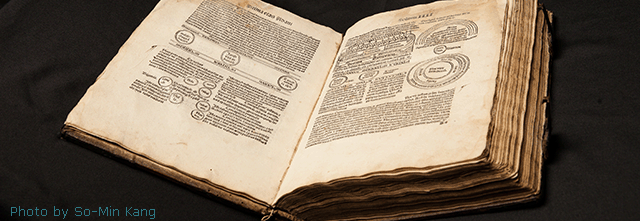-

Sammelbände: The Many Anthologies of Early Print
Michael Adair
This paper explores the meaning and context of Sammelbände incunabula, covering their place alongside other novel forms of information organization in a world of changing readership patterns, as well as their role as a response to the needs and challenges faced in the expanding and changing book trade of the early print period during the second half of the fifteenth century. It includes several appendices detailing Sammelbände known to contain early editions of the Malleus Maleficarum and Fasciculus temporum of Werner Rolewinck, and other, related works.
-

Possible Methods for Incunabula Digitization for Preservation and Analysis
Steven Andrews
This paper explores different approaches that PSU’s Special Collections Department might take toward digitizing its 1490 incunable containing Werner Rolewinck’s Fasciculus temporum and second-edition Malleus Maleficarum. Digitization will reduce wear-and-tear of the volume and allow access to its contents by a wider range of users.
-

Bookbinding and Production in Incunable Age Germany
Brooke Hardy
Printshops opened all over Germany shortly after 1450 with the invention of the metal moveable type printing press, marking Germany as the center of this new market. Each printer and binder had their own distinct characteristics featured in their works. They each had preferred materials or techniques, or simply had different materials available to them. This paper reviews aspects of incunable bookmaking and bookbinding to provide a broader material context for PSU’s 1490 codex.
-

Robert Lenkiewicz: Witchcraft Collector
Ashley M. Hood
In 2018, Portland State University purchased a medieval codex containing a 1490 printing of Werner Rolewinck’s Fasciculus Temporum and a 1490 edition of the Malleus Maleficarum printed in Speier, Germany, by Peter Drach. Based on information from the bookseller in France, PSU has concluded that the codex most likely came from the collection of Robert Lenkiewicz (1941-2002), a twentieth-century English figurative painter who amassed a significant collection of rare books and incunables during his life.
Lenkiewicz’s artwork, interests, and book collection revolved around addiction and fanaticism, and one of the more noteworthy sections of his library focused on witchcraft and the occult. Lenkiewicz owned at one time as many as ten copies of the Malleus Maleficarum, and his artwork and collecting habits demonstrated his fascination with all things witchcraft-related. From early editions of works by occultists like Robert Fludd, Henricus Cornelius Agrippa, and Johannes Nider, to a sixteenth-century witch’s remains, Lenkiewicz’s ongoing obsession with collecting artifacts of what he referred to as the “crazy notion” of witchcraft culminated in an early book collection that rivaled that of the British Library.
By examining Lenkiewicz’s interest in rare books and witchcraft, and the marks left by these interests in some of his artwork, we can create a picture of the environment in which PSU’s codex existed in recent years, and get a glimpse into its history through the lens of an eccentric and often enigmatic owner.
The essays in this section surround the 1490 codex in its historical context as a physical object, discussing phases of its provenance and how the codex relates to book production, distribution, collection, and preservation over time.
Printing is not supported at the primary Gallery Thumbnail page. Please first navigate to a specific Image before printing.


